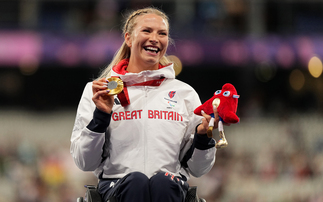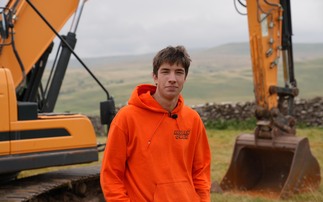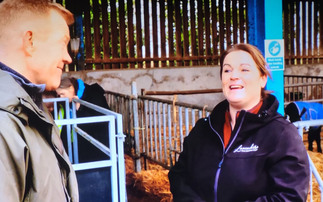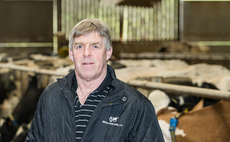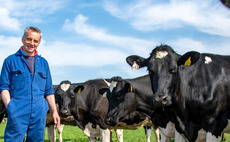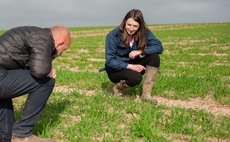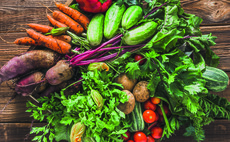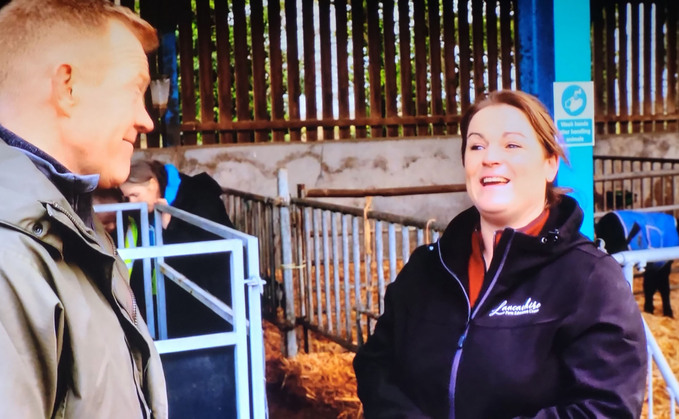
Elaine Smith with Adam Henson
It is hard to believe that dairy farmer Elaine Smith was once scared of cows. Coming from a non-farming background, she found herself in the industry after meeting her husband Paul, a dairy farmer from Croston, Lancashire.
Fast-forward to now and Elaine is leading the way in farm education, with a passion for bringing children of all ages to the farm's education centre on-site.
After being a full-time teacher, she has slowly cut down and focused more on the farm in the last five years.
Her lack of knowledge has, she says, helped her better connect to people from non-agricultural backgrounds, and her teaching experience sets her up to communicate in an effective way.
She also says it goes to show just what you can learn from immersing yourself in the industry.
READ NOW: Native breeds suit Lancashire farm
Change
The farm was originally spread across two sites, but their second farm in Eccleston became too much to handle, especially for Paul on his own.
So they decided to sell up and focus on the farm at Croston, pouring their energy into their two passions: dairy and education.
"We needed to change, and it gave us the opportunity to develop the education centre," says Elaine.
"We wanted to keep the cows but install robots – this lent itself to the education centre, which was always in the background when planning.
"There is a viewing window from the office and the robot room is big enough to fit a school class in.
"The robots mean that visitors can come and see a cow being milked any time of the day.
"The dairy is fundamental to what we do."
There is, she says, a massive disconnect when it comes to where food comes from, but the farm also offers respite and a natural environment for children to express themselves in. Reaffirming that connection is key to all Elaine does.
"A lot of work goes into producing a litre of milk," she says.
"Also, I come home and my head is whizzing from teaching all day, but I will go into the cow shed and just feel a sense of calm – imagine what that does for the children."
Opening the farm
Opening your farm up to the public takes a certain amount of confidence, but teaching has given her the knowledge to make it a ‘worthwhile visit'.
Children from the age of four and upwards are welcome – Elaine even invites A-level students studying the environment and science, with all sessions linking to the curriculum and whatever the specific groups visit the farm for.
She is also keen to ensure their visits are authentic.
She says: "We are a working farm – this is not a petting zoo – and they are coming to understand what we do here, and we are proud of that."
Elaine took on the NFU's Íæż½ã½ã for Schools training, and has since experienced things she would never have dreamed of, such as appearing on Countryfile with Adam Henson to talk about the NFU Stem project.
Downing Street
She also visited Number 10 Downing Street after being invited by Akshata Murty, the former Prime Minister Rishi Sunak's wife.
The idea was to bring children to Downing Street to showcase different industries, including food and farming.
Elaine says: "I was in the state dining room thinking of all the conversations those walls must have heard, and there I was just stood there.
"The children had to invent a canape collection, but the ingredients had to be British. I had to help the children design them and the advertising and present it back to the Prime Minister's wife.
"It was such an honour, and the whole experience was unbelievable – to see the kids' faces as well.
"The best people to target are kids. They are open-minded and can make their own judgements."
She has recently been nominated for an Enterprise Vision Award, for her commitment to all of the above and her dedication to making real change.
But Elaine's main goal is to give children the knowledge to make their own informed choices about food and, whatever that may be, acknowledge that somewhere along the line that food will have been produced by a farmer.
She also links her sessions to land stewardship and the maintenance of the countryside.
Farming in schools
More could be done in schools, however.
She nods to her national curriculum teaching book, which is over 200 pages, yet for key stage one and two there is only one sentence regarding food: 'Understand where food comes from'.
Elaine hopes to give schools a place to come and do that, and though her Mid-Tier Countryside Stewardship scheme, she can fund 24 visits per year – but that is not enough.
"We fill those in no time, and we need to be able to do more," she says.
"Some farmers in my area do not want to do the Stewardship visits, so why can I not take those, then more kids can come?
"It means once the 24 visits have gone, schools then have to pay for everything, and I have to choose who comes."
Elaine wants to focus on the education centre full-time – it is a far cry from the young woman who did not even want to be around cows, but she has found her role in helping bring children a little closer to the industry and takes great joy in seeing them experience the farm for the first time.
She says: "Some of these kids have never seen grass, and to see them run in the fields, fall over and laugh and get back up and go again is unbelievable."
- #FarmingCAN - What is it? Farming CAN is a campaign that aims to show the public just how vital farming can be to society. Find out more here








